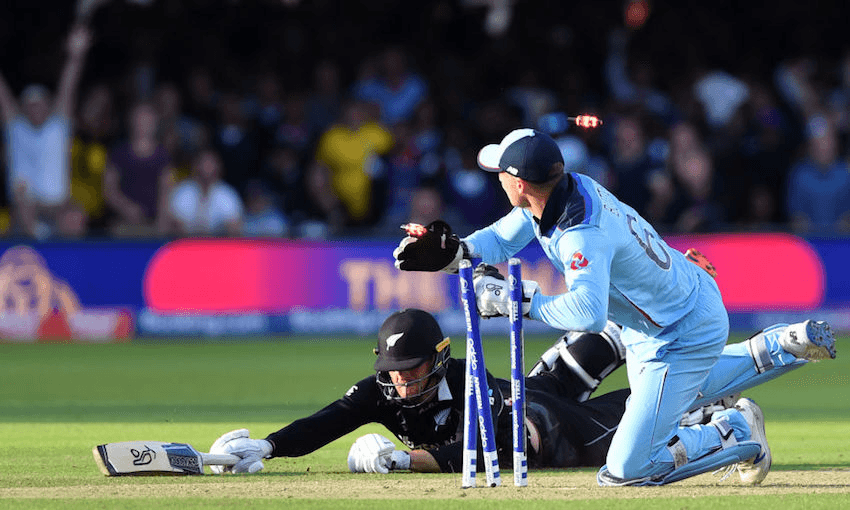The Black Caps were a critical part of what is probably the greatest game of cricket ever played, writes Duncan Greive. Is that enough to get over having lost it?
It’s hard to imagine a more hollow consolation than having played the crucial supporting role in the greatest game of cricket any of us will likely ever see. For England to feel this moment, New Zealand had to chart an impossible course at a macro level – the promise and slow decline of our batting, the beautiful ratcheting of our innings in the field.
Yet the tidal flow of this final is likely already forgotten due to the wrenching twists of the final few deliveries, and the nauseating super over to conclude this absurd, unscriptable conclusion. Trent Boult alone participated in at least three career-defining plays within minutes – the boundary catch of Stokes which turned into a six, and the two infinitely calm runouts which in any sane world would have ended the game.
The sides were so tightly entwined on the field that it was entirely fitting that Stokes, a player to whom both sides could lay plausible claim, effectively decided the final. And he did so by the barest of margins, playing for an English team which was inspired by Brendon McCullum’s blazing batting and captaincy of the 2015 World Cup, while winning in a near-facsimile of the game of inches which has defined Williamson’s leadership and batting during this World Cup.
The game began in a familiar style, with New Zealand daring to dream that Guptill would break out of this funk, before another diffident dismissal. Typically, this led not to capitulation but to an increasingly ebullient rebuild. While the key combatants were different – Nicholls and Latham played the roles of Williamson and Taylor – the end result was near identical to that of the semi-final against India. A score below expectations but which felt close enough to par that memories of the abject failure at the MCG were cast well aside.
Boult and Henry opened the bowling as well as they did against India, but the ball slipped past the bat instead of clipping it, chances just out of reach rather than shockingly grasped. Still, aside from a crushing caught and bowled chance dropped by an otherwise extraordinary de Grandhomme, New Zealand never let that ferocious upper order loosen its shoulders.
The first partnership to really stick was Stokes and Buttler, who were in control but never quite able to dominate. When Buttler fell with the line within sight, the game swung back toward New Zealand, and in truth the pendulum never really returned.
So how did New Zealand contrive to lose? Through a series of events which it seems fair to state will never be replicated as long as the game is played. A boundary glancing off an outstretched bat is something many fervent fans will only rarely have seen, and never at such a crucial stage of a game. Let alone one of this magnitude. The way runs and wickets broke agonisingly back and forth was pure sports movie cliche. The tie the only appropriate result. The super over necessary but avowedly evil.
When it finally ended, the game had gone long past the natural emotional range of most fans. I wasn’t meant to write this report – my colleague Simon Day demurred. “I’ve got nothing bro. I’m a desert. I’m empty.”
Less than an hour later, those three sentences describe me perfectly. (In fact, listen to the first 30 seconds of the embedded episode of our cricket podcast The Offspin to hear Day capture how we’re all feeling). Yet even as this very specific sporting hell was staggering to its conclusion, much of the time with the odds in our favour, I was conscious that this game was different. That its winner was capriciously chosen, and its loser as critical to its narrative.
That for once the victor was truly selected by chance, and that to have been part of this freakish dance was better than the winning of most world championships.
At least, that’s the story I’m telling myself now as I try and go to sleep. A lie of necessity to defend a battered sporting psyche, after an utterly perfect match with an entirely devastating conclusion.


